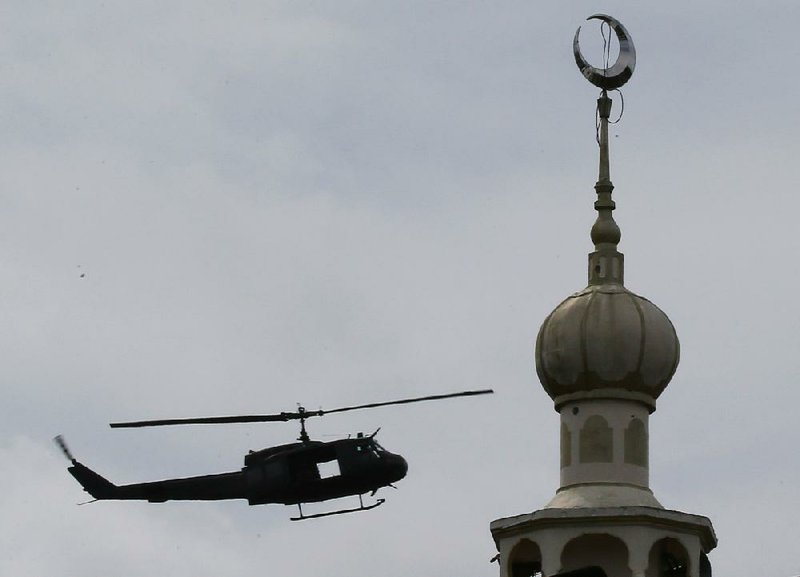MARAWI, Philippines -- Philippine forces control most of a southern city where militants linked to the Islamic State militant group began a bloody rampage nearly a week ago, authorities said Monday, as the army launched airstrikes and went house-to-house to crush areas of resistance.
The Philippine military chief of staff said today that about 70 percent of the city had been retaken.
Gen. Eduardo Ano said in an interview that at least four foreign fighters -- three Malaysians and an Indonesian -- were among the militants killed in the fighting, citing the latest intelligence on the matter. Other fighters killed could possibly be Arab extremists, he said.
"It's just a matter of time for us to clear them from all their hiding places," Ano said of the gunmen, speaking at a hospital where injured soldiers were being treated.
The militants had planned to set the city ablaze, he said, and to kill Christians in nearby Iligan city on Ramadan, the Muslim holy month of fasting, to mimic the violence seen by the world in Syria and Iraq.
Ano also said today that the militants' commander, Isnilon Hapilon, was still hiding somewhere in the city. Authorities were working to confirm that another top militant had been killed.
On Monday, the government reported a death toll of 105 people -- 61 militants, 20 government forces and 24 civilians. Many more were believed to be trapped inside the city.
"I have to rescue my grandfather even at the risk of my life," Khana-Anuar Marabur Jr. said after police stopped him for speeding through a checkpoint. He said his grandfather had been sending him text messages asking to be saved.
"Get me out of here alive, not dead," one message said.
The crisis in Marawi, which is home to about 200,000 people, has raised fears that extremism in the southern Philippines is increasing as smaller militant groups unify and align themselves with the Islamic State.
Only small areas of Marawi remain under militants' control after six days of fighting, said Brig. Gen. Restituto Padilla, the military spokesman. In recent days, gunmen have managed to fend off attack helicopters, armored vehicles and scores of soldiers.
Philippine National Police Chief Ronald de la Rosa said the operation was taking time because the gunmen are taking advantage of the urban environment, moving quickly from building to building to evade capture.
The bodies of several civilians were found on the streets Sunday as soldiers cleared neighborhoods. In one area, the bodies of eight men who appeared to have been executed by militants were found in a ravine, police said. The bodies of four other men, three women and a child were found near a road close to Mindanao State University in Marawi.
The violence prompted President Rodrigo Duterte last week to declare 60 days of martial law in the southern Philippines, where a Muslim separatist rebellion has raged for decades. Marawi is a mostly Muslim city.
The violence broke out May 23 when the government launched a raid to capture Hapilon, who is on Washington's list of most-wanted terrorists. But the operation went awry and militants rampaged through the city, torching buildings and battling government forces in the streets.
A priest and several worshippers were taken hostage. There was no word on their condition.
Hapilon, an Islamic preacher, was once a commander of the Abu Sayyaf militant group, which pledged allegiance to the Islamic State in 2014. He now heads an alliance of at least 10 smaller militant groups.
A Section on 05/30/2017


